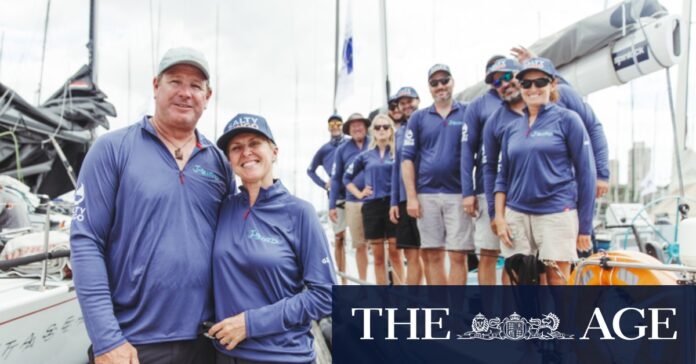[ad_1]
“But for us, every litre of oil has to be pulled out of the ground, transported to a refinery, refined, transported to the place, put into a bowser, and then you burn it just like that. Whereas our batteries are going to last us 20 years. If no one takes that first step, it’s never going to happen.”
The obvious question about all this is, well, aren’t boats prohibited from using engines while racing anyway? That is not the case. While yachts are not allowed to use motors to run a propeller, the bigger boats use motors to power the winches that hoist and adjust the sails, to aid canting keels, and for electricity to power communications equipment, computers and lights. That, of course, is run off diesel.

Lithium batteries power Ocean Crusaders J-Bird.Credit: Dion Georgopoulos
Regulations also dictate every boat must carry a minimum supply of fuel for emergencies.
“For example, the Grand Prix yachts cannot sail without an engine going,” Annika says. “So the mainstream think that if you’re a sailing yacht, what do you need an engine for? They run hydraulic keels, hydraulic winches, the masts and stuff. So for some of the boats, if their engine dies, they have 45 minutes before they cannot sail the boat any more.
“We have enough battery power here and solar panel on deck to actually get the distance as long as you need. The longest we have been out is 11 days and it was not a problem at all. We can generate when we are cruising.
“When we do over six knots we put a hydro on the propeller, so we’re actually generating with a drag through the water. It’s like a hydro motor, and then we generate the same amount of electricity as we use in a day. So there’s no excuse to not have electric motoring.”
Loading
J-Bird does not use gas for cooking, either. A convention microwave and cooktop are down in the galley, and all food is prepared sustainably – most of it at home before the race. Ian, who was heavily involved in the electrical engineering, says other crew and a boat builder have shown interest this past week and hopes organisers pay close attention.
“So last year when we did two-handed, it was paving the way for the future,” Ian says. “Whilst they’re still making us carry fuel, we’re talking to them consistently and they’re now looking at it. And when someone else comes, we’ve set a standard of what they need to do. That was one of the things we wanted to do, just be the innovators.”
[ad_2]
Source link


